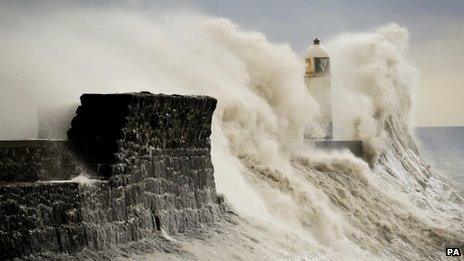Welsh flood review details revealed by minister Alun Davies
- Published

Huge waves battered the coasts of Wales during storms last week
A review ordered following the recent storms will look at the impact of flooding and the state of Wales' coastal defences.
Natural Resources Minister Alun Davies said it would look at December and January's flooding incidents and cover all coastal authorities in Wales.
The first phase this month will look at the direct impact of the floods.
The second part will look at what lessons can be learnt and the flood risk management in the affected areas.
Mr Davies ordered the review on 5 December following some of the some of the worst weather conditions Wales has seen in over 20 years.
'Undoubtedly saved lives'
There was severe flooding along the coast and several train lines remain closed due to damage.
Hundreds of residents on Aberystwyth's seafront were evacuated while the A487 in Newgale is still closed after tons of pebbles were washed ashore.
Mr Davies said the storms had severely tested Wales' coastal defences, but things could have been much worse.
He praised the response of emergency services who he said had "undoubtedly saved lives".
Flood defence improvements in areas including Newport, Borth, and Colwyn Bay, had prevented or lessened flooding, Mr Davies added.
"We are now looking at how we prioritise future investment in flood defences so we can not only protect homes and businesses but also maximise opportunities for economic regeneration and growth in the long term," he said.
"We know that our changing climate means that extreme weather events such as this are not going to go away. It is impossible to prevent flooding but we are working hard to build resilience around our coasts in Wales."
Repair damage
The Welsh government is working with local authorities and Natural Resources Wales, external (NRW) to see how they can help in the aftermath of the floods.
Mr Davies said they were in talks with the UK government about an application to the EU Emergency Solidarity Fund, originally set up to help those affected by the 2002 floods in Eastern Europe.
Councils will be able to apply for grant funding for emergency works to restore damaged defences, he said.
Several roads in Pembrokeshire were damaged during the storms, including the road along Amroth seafront, which was partially wash away.
Darren Thomas, head of highways for Pembrokeshire council, said they had applied for emergency funding, but were pressing ahead with repairs in the meantime.
"Clearly the sooner we get any sort of financial support the better. We are not hanging back in terms of our response to the conditions, we will execute the repairs at Amroth as quickly as we can," he said.
"If any additional finance comes in, that's going to help us enormously."
Emyr Roberts, chief executive of Natural Resources Wales, said staff had already completed emergency work on many sea defences, but warned some repairs would take much longer.
"We will then look at what lessons can be learned from these storms and what can be done to improve the situation for the people who live and work along the Welsh coastline," he said.
Over the term of the current administration, the Welsh government is investing more than £240m in flood and coastal defences.
- Published6 January 2014
- Published4 January 2014
- Published4 January 2014
- Published4 January 2014
- Published3 January 2014